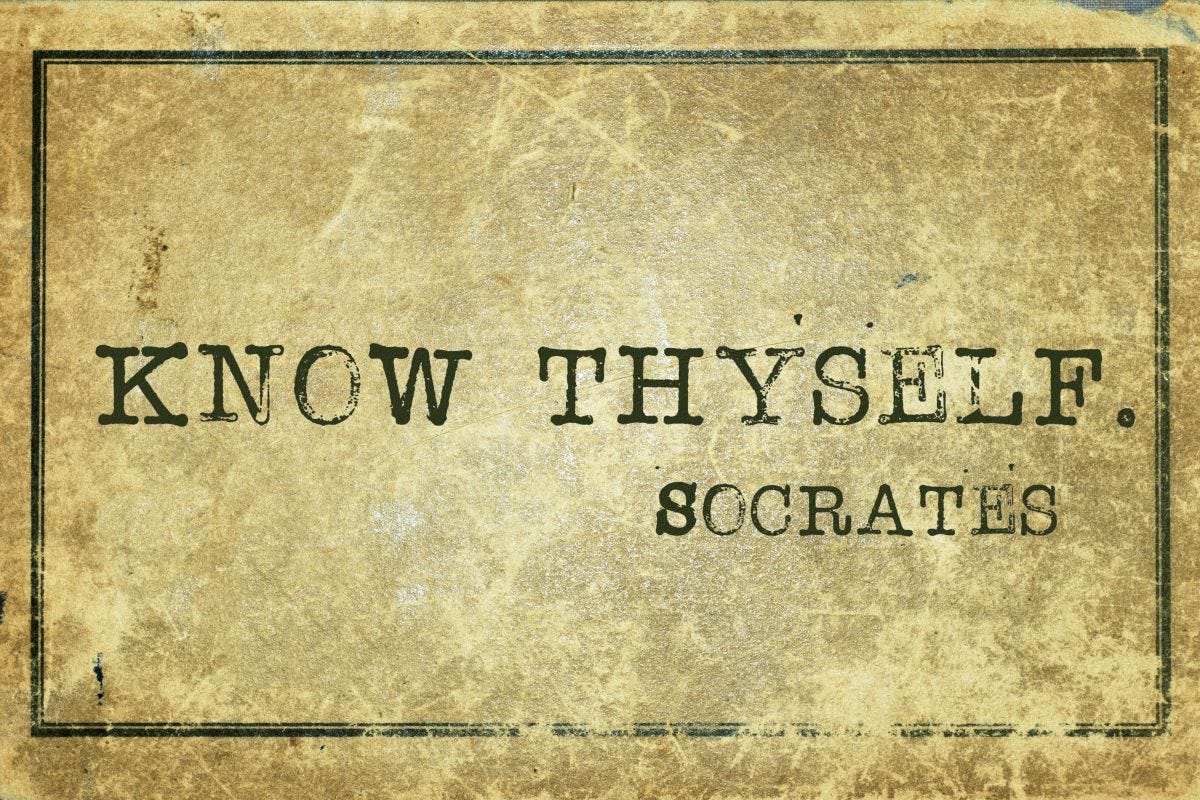Stop acting in everyone else's play
Influencers are susceptible to being captured by their audience. Women are susceptible to being captured by everyone around them. As a result of their societal conditioning, much more so than men.
“Know thyself” isn’t ancient wisdom anymore.
It’s a survival strategy. And if you’re constantly measuring yourself against what others expect, adjusting to keep the peace, or second-guessing what you want, you need it. Now more than ever.
Because your identity is under siege and you may not even be aware of it.
The Old World vs The New World
There was a time—not that long ago—when the direction you got about who you are and were supposed to be came from a pretty small circle.
Your family. Your friends. Your colleagues. People who actually knew you. People you knew well in return. Sure, they had opinions. Some helpful, some not. But the volume was manageable, and the sources were knowable.
Now? Identity direction comes from countless strangers.
Comments on your parenting from people in the grocery store. Opinions about your career choices from relatives you see once a year. Judgments about how you look, what you wear, whether you’re “doing enough” from acquaintances and social media observers. An endless stream of opinions from people who’ve never lived your life about what’s okay and what isn’t, who you should be and what you should care about.
The volume is relentless. The velocity is dizzying.
We all think we’re immune to it. We tell ourselves we don’t care what others think. But we’re lying.
If you’ve ever changed your plans because you were worried what your family would say, you’re not immune. If you’ve felt that little glow when someone praised you for being “such a good wife” or “so patient with the kids,” you’re not immune.
(I’m not either, by the way. I wish I could tell you I’m above all this. I’m not.)
We’re all susceptible to feeling pressure from other’s opinions. The question is whether we’re going to let it define us.
The Danger: Audience Capture
Gurwinder wrote about this brilliantly—he calls it “audience capture.” It’s what happens when influencers become trapped by their audience’s expectations.
They start creating content that serves the audience’s desires instead of their own vision. Slowly, they morph into who their audience needs them to be. They lose themselves in the performance.
[examples from the article]
But here’s what struck me: This isn’t just an influencer problem.
It’s an exact parallel for what happens to women through societal conditioning.
Anyone who attaches more value to what others think than what they think themselves is at risk. And for most women, that conditioning started early and runs deep.
The performance trap is subtle. You don’t wake up one day and decide to become someone else. It happens gradually.
You received the messages about what was expected of you, as a girl, a woman, a wife, a mother. You felt the approval when you complied and sensed the criticism whether it was outspoken or implied.
Before long, you started playing the role you were supposed to play, the one that wins you favor with your family and friends. But all the while you’re losing touch with what you actually value, believe, and want. The erosion happens slowly, but the cost is real.
You end up living someone else’s life while thinking it’s yours.
Why “Know Thyself” Is Your Antidote
Self-knowledge is your immunity to external definition.
When you know who you are—I mean really know—others’ opinions lose their power over you. They become data points, not directives.
Eleanor Roosevelt said it best: “No one can make you feel inferior without your consent.”
She was onto something. You can decide not to give anyone sway over your confidence or sense of self-worth. You can decide that their opinions about you are interesting, but not authoritative.
That only works if you’ve done the work of knowing yourself first.
Your values, desires, and boundaries need to be non-negotiable reference points. Not because you’re arrogant or closed-minded, but because you have clarity.
Clarity about who you are makes you immune to being told who you should be.
It’s not about ignoring opinions and direct feedback entirely. I’m not suggesting you become a narcissist who dismisses everyone. (That’s just another kind of trap.)
When you know your values, when you know who and what you want to be, and are clear on how you show up, you have something invaluable: a baseline against which you can evaluate all direction and feedback. So you can take what’s useful and leave what isn’t.
Without it you’re adrift in a sea of opinions, and they will shape you whether you realize it or not.
How to actually know yourself (not just think you do)
Okay, so self-knowledge is the answer. Great.
But how do you actually do it? Because most people think they know themselves, and most people are wrong.
Here’s what’s worked for me—and what I’ve seen work for the people I coach.
Get clear on your values
This is where you start. Your values are at your core. They’re what ground you.
And you need to know them to distinguish what you actually want from what others have told you all your life.
What do you stand for? What’s non-negotiable for you? What would you defend even if it cost you approval?
I’m not talking about abstract virtues you picked off a list somewhere. I’m talking about the lived values that show up in your choices.
Look at your life. What do you protect? What do you sacrifice for? What pisses you off when someone violates it?
That’s your values talking.
Write them down. Get specific. Because vague values don’t help you when you’re facing a decision and everyone around you is telling you what you should do.
Figure out what YOU want
Not what your parents wanted for you. Not what your friends think you should want. Not what earns you praise for being a “good woman.”
What do you want?
This is harder than it sounds. Most of us have been conditioned for so long that we’ve internalized other people’s desires as our own.
So start asking: If no one would ever know, what would I choose? If no one was watching or listening, what would I do? If I had 200 million in the bank, what would I pursue?
The answers might surprise you. They might even scare you.
Good. That means you’re getting close to the truth.
Track your reactions as data
Strong reactions—especially anger or frustration—reveal your values.
When something pisses you off, ask yourself: What got trampled here? What boundary was crossed?
Your emotions are information. They’re telling you something about what matters to you.
I learned this the hard way. For years, I thought I was just “too sensitive” or “too reactive.” Bollocks. I was reacting to violations of values I hadn’t yet articulated.
Once I started treating my emotions as information instead of intrusions into my rationality, I started gaining much more clarity about who I am and want to be.
Question whose voice is in your head
When you’re making a decision, whose voice do you hear?
Is it yours? Or is it your mother’s? Your old boss’s? The internet’s?
This is the work of disentangling yourself from conditioning. And it’s not easy.
We’ve all absorbed messages our entire lives about who we should be, what we should want, how we should behave. Those messages live in our heads and masquerade as our own thoughts.
Start noticing. When you think “I should do X,” ask: Should according to whom?
If it’s not yours, it doesn’t belong in your decision making.
Watch for the performance
Pay attention to when you’re performing versus when you’re being.
There’s a difference, and you can feel it if you’re honest with yourself.
Performing is when you’re stopping yourself from doing what comes naturally. When you’re thinking about how it looks, or what others would say.
Being is when you’re just... you. No filter, no performance, no second-guessing.
You probably perform more than you realize. I do. And the digital age has all of us performing more than ever.
But if you never stop performing, you lose touch with who you are.
So carve out time and space where you’re not performing. Where no one’s watching. Where you can just be. And take note of what comes up.
That’s where you’ll find yourself.
Regular audit: Am I doing this for me or to keep others comfortable?
Make this a habit. A ritual.
Before you agree to anything, like a request for your time, ask: Do I want to do this? What would I need to drop to do it? Because saying yes to one thing, means saying no to everything else for the duration.
I’m not saying everything has to be for you. Sometimes you do things for others, and that’s fine. That’s called being a decent human.
But you should know whether you’re doing it because you want to or because your default is pleasing others.
If you catch yourself doing something purely for the validation and approval, or out of fear that you’d lose those—that’s your signal. You’re drifting.
Pull yourself back.
The stakes are higher than you think
Your identity requires active defense.
It’s not enough to passively absorb direction and feedback from everyone around you and hope you stay intact. You won’t.
The default is drift. The default is becoming who everyone else needs you to be.
You have to choose differently. You have to do the hard work of knowing yourself—actually knowing yourself, not just thinking you do.
It’s uncomfortable work. It requires looking at conditioning you’ve carried your whole life. It requires questioning voices that have been in your head so long you thought they were yours.
But here’s what you get in return: You get to live your actual life. Not a crowdsourced version of it. Not a performance optimized for everyone else’s comfort.
Your life. The one that’s yours.
And in a world where women’s identities are still largely defined by how well they serve others, that’s radical.
So go do the work. Figure out your values. Decide what you want out of your life. Distinguish your voice from the conditioning. Build the anchor.
Because “know thyself” isn’t just ancient wisdom anymore.
It’s the only way to live your life instead of the one everyone else scripted for you.









